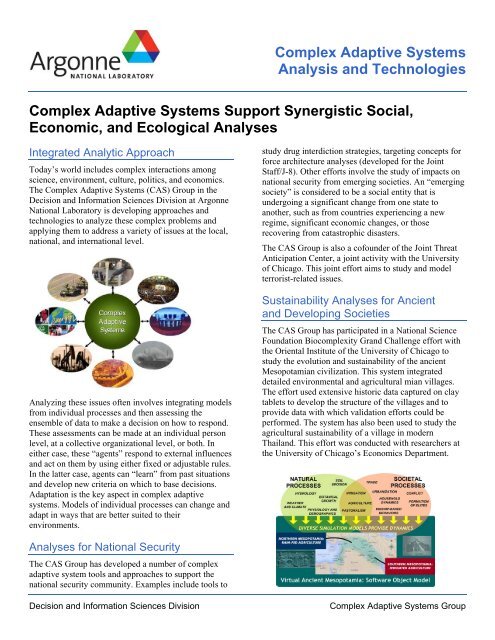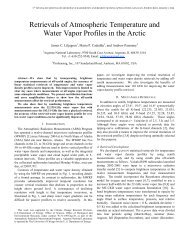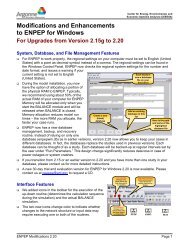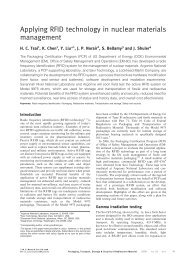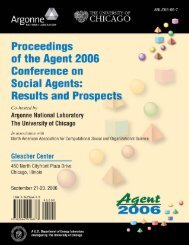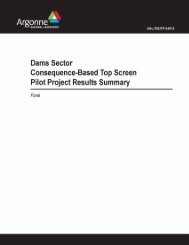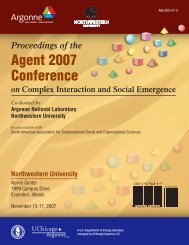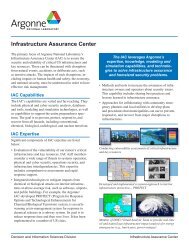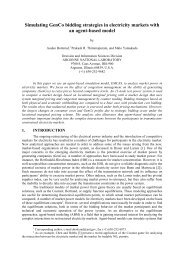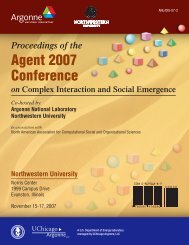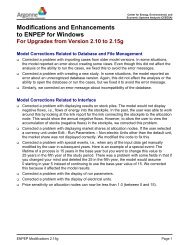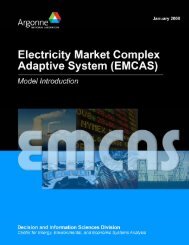Complex Adaptive Systems Analysis and Technologies Complex ...
Complex Adaptive Systems Analysis and Technologies Complex ...
Complex Adaptive Systems Analysis and Technologies Complex ...
Create successful ePaper yourself
Turn your PDF publications into a flip-book with our unique Google optimized e-Paper software.
<strong>Complex</strong> <strong>Adaptive</strong> <strong>Systems</strong><br />
<strong>Analysis</strong> <strong>and</strong> <strong>Technologies</strong><br />
<strong>Complex</strong> <strong>Adaptive</strong> <strong>Systems</strong> Support Synergistic Social,<br />
Economic, <strong>and</strong> Ecological Analyses<br />
Integrated Analytic Approach<br />
Today’s world includes complex interactions among<br />
science, environment, culture, politics, <strong>and</strong> economics.<br />
The <strong>Complex</strong> <strong>Adaptive</strong> <strong>Systems</strong> (CAS) Group in the<br />
Decision <strong>and</strong> Information Sciences Division at Argonne<br />
National Laboratory is developing approaches <strong>and</strong><br />
technologies to analyze these complex problems <strong>and</strong><br />
applying them to address a variety of issues at the local,<br />
national, <strong>and</strong> international level.<br />
Analyzing these issues often involves integrating models<br />
from individual processes <strong>and</strong> then assessing the<br />
ensemble of data to make a decision on how to respond.<br />
These assessments can be made at an individual person<br />
level, at a collective organizational level, or both. In<br />
either case, these “agents” respond to external influences<br />
<strong>and</strong> act on them by using either fixed or adjustable rules.<br />
In the latter case, agents can “learn” from past situations<br />
<strong>and</strong> develop new criteria on which to base decisions.<br />
Adaptation is the key aspect in complex adaptive<br />
systems. Models of individual processes can change <strong>and</strong><br />
adapt in ways that are better suited to their<br />
environments.<br />
study drug interdiction strategies, targeting concepts for<br />
force architecture analyses (developed for the Joint<br />
Staff/J-8). Other efforts involve the study of impacts on<br />
national security from emerging societies. An “emerging<br />
society” is considered to be a social entity that is<br />
undergoing a significant change from one state to<br />
another, such as from countries experiencing a new<br />
regime, significant economic changes, or those<br />
recovering from catastrophic disasters.<br />
The CAS Group is also a cofounder of the Joint Threat<br />
Anticipation Center, a joint activity with the University<br />
of Chicago. This joint effort aims to study <strong>and</strong> model<br />
terrorist-related issues.<br />
Sustainability Analyses for Ancient<br />
<strong>and</strong> Developing Societies<br />
The CAS Group has participated in a National Science<br />
Foundation Biocomplexity Gr<strong>and</strong> Challenge effort with<br />
the Oriental Institute of the University of Chicago to<br />
study the evolution <strong>and</strong> sustainability of the ancient<br />
Mesopotamian civilization. This system integrated<br />
detailed environmental <strong>and</strong> agricultural mian villages.<br />
The effort used extensive historic data captured on clay<br />
tablets to develop the structure of the villages <strong>and</strong> to<br />
provide data with which validation efforts could be<br />
performed. The system has also been used to study the<br />
agricultural sustainability of a village in modern<br />
Thail<strong>and</strong>. This effort was conducted with researchers at<br />
the University of Chicago’s Economics Department.<br />
Analyses for National Security<br />
The CAS Group has developed a number of complex<br />
adaptive system tools <strong>and</strong> approaches to support the<br />
national security community. Examples include tools to<br />
Decision <strong>and</strong> Information Sciences Division<br />
<strong>Complex</strong> <strong>Adaptive</strong> <strong>Systems</strong> Group
Modeling <strong>Complex</strong>ities in the Electricity<br />
Market<br />
EMCAS (Electricity Market <strong>Complex</strong> <strong>Adaptive</strong> System)<br />
is an agent-based simulation model of the electric power<br />
market designed to investigate market restructuring <strong>and</strong><br />
deregulation <strong>and</strong> to underst<strong>and</strong> implications of a<br />
competitive market on electricity prices, availability, <strong>and</strong><br />
reliability. The agents in EMCAS represent the<br />
participants in the restructured electricity market.<br />
Training <strong>and</strong> Outreach<br />
The CAS Group conducts training in the use of agentbased<br />
modeling tools with the Santa Fe Institute. CAS<br />
also sponsors an annual conference on agent methods,<br />
theory <strong>and</strong> applications in conjunction with the<br />
University of Chicago.<br />
Different types of agents capture the heterogeneity of<br />
restructured markets, including generation companies,<br />
dem<strong>and</strong> companies, transmission companies, distribution<br />
companies, independent system operators, consumers,<br />
<strong>and</strong> regulators. The agents perform diverse tasks using<br />
specialized decision rules. Agents learn about the market<br />
response to their bids, infer competitors’ strategies <strong>and</strong><br />
adapt their actions accordingly. Agents continually<br />
explore new strategies in response to dynamic supply<br />
<strong>and</strong> dem<strong>and</strong> forces <strong>and</strong> identify strategies that perform<br />
better.<br />
Learn more about <strong>Complex</strong> <strong>Adaptive</strong> <strong>Systems</strong> at:<br />
http://www.dis.anl.gov/<br />
For more information, contact:<br />
Dr. John R. Hummel (jhummel@anl.gov) or Dr. Charles M. Macal (macal@anl.gov)<br />
Decision <strong>and</strong> Information Sciences Division, <strong>Complex</strong> <strong>Adaptive</strong> <strong>Systems</strong> Group<br />
Argonne National Laboratory<br />
9700 S. Cass Avenue, Bldg. 900<br />
Argonne, IL 60439, USA<br />
A U.S. Department of Energy laboratory<br />
managed by Uchicago Argonne, LLC


